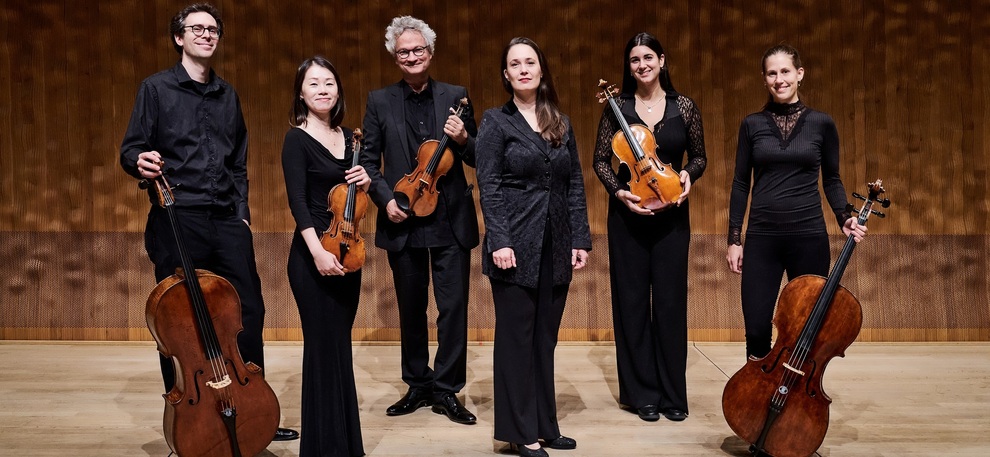Sun, May 11, 2025, 11.00 am | Elbphilharmonie, Recital Hall
6th chamber concert
Texts from “Capriccio” by Richard Strauss and Clemens Krauss
Richard Strauss: Sextet for strings from the opera “Capriccio”
Ludwig van Beethoven: String Quartet No. 9 in C major op. 59 No. 3
Toshiro Mayuzumi: Prelude for string quartet
Robert Schumann: Poet's Love op. 48 - arrangement for voice and string quartet by Wim ten Have
Mezzo-soprano: Ida Aldrian
Viola: Iris Icellioglu
Violoncello: Merlin Schirmer
Amaris Quartett:
Violin: Hibiki Oshima
Violin: Felix Heckhausen
Viola: Maria Rallo Muguruza
Violoncello: Clara Grünwald
Ida Aldrian
Mezzo-sopranoBirthplace:
Bruck an der Mur, Austria
Studies:
University of Music and Performing Arts Vienna with Leopold Spitzer and Karlheinz Hanser; studies for Stage Performance (Opera and Musical Drama), Art Song and Oratorio with KS Marjana Lipovšek with honors; member of International Opera Studio of the Hamburg State Opera (2012/13–2013/14)
Master class:
With Ann Murray, Bernarda Fink, Reri Grist, Peter Kooij, Andrew Watts, Thomas Hampson, Wicus Slabbert, Alan Titus, Brigitte Fassbaender, et al.
Prizes:
Dr.-Wilhelm-Oberdörffer-Preis of Stiftung zur Förderung der Hamburgischen Staatsoper (2014), prize winner of the jury ranking at international singing competition „Stella Maris“ (2014)
Relation to the State Opera:
Ensemble member of the Hamburg State Opera since the season 2019/20
Important parts:
Wellgunde (Das Rheingold and Götterdämmerung), Siegrune and Rossweiße (Die Walküre), Blumenmädchen and Stimme aus der Höhe (Parsifal ), 2. Maid (Daphne), Feodor (Boris Godunov), Maddalena (Rigoletto), Hansel (Hansel and Gretel), Isabella (L'Italiana in Algeri), Adalgisa (Norma), Idamante (Idomeneo), Third Lady (The Magic Flute), Rosina (Il Barbiere di Siviglia), Penelope (Il Ritorno d'Ulisse in Patria), Mercedes (Carmen), Tisbe (La Cenerentola), Laura (Luisa Miller), Flora and Annina (La Traviata), Cherubino (Le Nozze di Figaro), Dorabella (Così fan tutte), Meg Page (Falstaff), Dryade (Ariadne auf Naxos), Orlofski (Die Fledermaus), et al.
Stages:
Elbphilharmonie, Concertgebouw Amsterdam, Kölner Philharmonie, Wiener Konzerthaus, Musikverein Wien, Staatstheater Nürnberg, Grafenegg Festival, Laeiszhalle Hamburg, Barocktage Melk, Styriarte, International Brucknerfest Linz, Staatsoper Unter den Linden, et al.
Cooperation with directors:
Andreas Homoki, Georg Schmiedleitner, Laura Scozzi, Mariame Clément, Verena Stoiber, Peter Konwitschny, Stéphane Braunschweig, David Bösch, et al.
Cooperation with conductors:
Simone Young, Kent Nagano, Martin Haselböck, Marcus Bosch, Yutaka Sado, Pablo Heras-Casado, Christopher Moulds, Cornelius Meister, Fabio Luisi, Andrés Orozco-Estrada, Simon Gaudenz, et al.
Iris Icellioglu
ViolaBorn in Izmir, violist Iris Icellioglu discovered her passion for the viola at the age of nine. She began her studies at the Dokuz Eylül College of Music in Izmir with Pinar Dinçer and continued with Prof. Dr. Çetin Aydar and Prof. Hartmut Lindemann. She completed her bachelor's degree with distinction in 2016. She began her master's degree with Prof. Roland Glassl and later continued it with Prof. Pauline Sachse at the Lübeck University of Music, where she successfully graduated. She has had the opportunity to take part in chamber music masterclasses with eminent musicians such as Emile Cantor, Ruşen Güneş, Ron Ephrat, Máté Szücs and Eberhard Feltz. During her studies in Germany, she was awarded the Yehudi Menuhin Live Music Now Scholarship with three different chamber music groups.
Between 2015 and 2017, she was a permanent member of the Karsiyaka Chamber Orchestra. She was later part of the Orchestra Academy of the Hamburg Philharmonic State Orchestra and performed as a guest artist with orchestras such as the Berlin Radio Symphony Orchestra, the Hamburg Symphony Orchestra and the NDR Elbphilharmonie Orchestra.
She has performed as a soloist with the Dokuz Eylül Academic Orchestra and the Karsiyaka Chamber Orchestra. As part of the 45th Istanbul Festival, she won the “Festival seeks its young soloist” competition and performed as a soloist with the DESO under the direction of Hakan Şensoy.
Icellioglu has been a permanent member of the Hamburg Philharmonic State Orchestra since 2022. She has worked with conductors such as Jonathan Nott, Vasily Petrenko, Alan Gilbert, Kent Nagano, Vladimir Jurowsky and Ádám Fischer and has performed as an orchestral and chamber musician in world-famous concert halls such as Carnegie Hall, Berlin Philharmonie, Elbphilharmonie, Suntory Hall and Sala São Paulo.
Merlin Schirmer
VioloncelloMerlin Schirmer was born in Stuttgart in 1988. His first cello teacher was Erik Borgir, who awakened an interest in contemporary music in his student early on. Merlin Schirmer studied in Stuttgart and Vienna, his teachers including Rudolf Gleißner, Claudio Bohórquez and Valentin Erben, cellist of the former Alban Berg Quartet. Early on, he developed the wish to join a major opera or symphony orchestra. First steps on his path toward this goal were his membership in the Gustav Mahler Jugendorchester founded by Claudio Abbado and an internship with the SWR Radio Symphony Orchestra Stuttgart. Towards the end of his studies, Merlin Schirmer was first appointed principal cellist of the Jena Philharmonic for a year and then joined the Dresden Philharmonic for another year as a cellist, before becoming a member of the Hamburg Philharmonic State Orchestra in August 2015.
Hibiki Oshima
ViolinHibiki Oshima was born in Yokohama. At the early age of eleven, she had made up her mind to get to know Europe and its culture, and a year later she had the chance to implement this plan on a lengthy journey. These impressions led her to enrol at the Vienna University of Music and Performing Arts after completing her secondary education. There, her teachers included Rainer Küchl, Johannes Meissl and Avedis Kouyoumdjian. She has performed at numerous music festivals, including Wien Modern, the Pacific Music Festival, the Bienal Musica Hoje and ECMA in Switzerland. She completed her education by taking courses with Gerhard Schulz, Anner Bylsma, Hatto Beyerle and Heime Müller. In 2006/07 Hibiki Oshima was a fellow of the Herbert von Karajan Centre. She won the First Prize at the Chamber Music Competition Pietro Argento as well as the Second Prize and special prize at the Premio Internazionale di Musica “G. Zinetti”. In addition, she received the Eduard Söring Prize of the Foundation for the Support of the Hamburg State Opera in 2011. Her passion for chamber music and contemporary music led her to join ensembles such as the Hibiki Quartet and the Ensemble Platypus, with which she has presented numerous world premieres by young composers. After an engagement as First Concertmaster with the Württembergische Philharmonie Reutlingen, she has been section leader of the second violins of the Hamburg Philharmonic State Orchestra since 2010. When she is not playing the violin, she likes to cook and dedicates herself to her secret passion, paragliding.
Felix Heckhausen
ViolinFelix Heckhausen was born in Bochum. At the age of 16 he became a junior student at the Munich Academy of Music. After his graduation from secondary school, further violin studies took him to Düsseldorf, where Michael Gaiser was his teacher, and to Freiburg, where he studied with Rainer Kussmaul. Master courses with the Amadeus Quartet and Walter Levin and baroque violin courses, among others, rounded out his education. During this time he was an active member of the Junge Deutsche Philharmonie. Since his concert examination in 1995, he has been a member of the Hamburg Philharmonic State Orchestra. An enthusiastic chamber musician, he dedicates his free time to his children and likes to cook. He is also a passionate paraglider.
Maria Rallo Muguruza
ViolaMaria Rallo Muguruza was born in Hondarribia, Spain, in 1996. She studied viola with Pauline Sachse in Dresden. She gained her first orchestral experiences as a member of the Gustav Mahler Jugendorchester and the academy of the Radio Symphony Orchestra Berlin. She has been a member of the Hamburg Philharmonic State Orchestra since 2017.
Clara Grünwald
VioloncelloClara Grünwald was born in Munich in 1990, receiving her first cello lessons at the age of six. From 2009 to 2015 she studied with Martin Ostertag at the Karlsruhe Music Academy and attended master courses with Wolfgang Emanuel Schmidt, Wolfgang Boettcher, Guido Schiefen, Thomas Demenga and Morten Zeuthen. Clara Grünwald held scholarships from the Heinrich Hertz Society (2009) and from Yehudi Menuhin’s “Live Music Now” (2012). She gathered orchestral experience as a substitute of the Munich Philharmonic Orchestra and as a member of the Bavarian Radio Symphony Orchestra’s academy. Since 2015 she has been associate principal cellist of the Hamburg Philharmonic State Orchestra.
Making music together in the Amaris Quartet is like a refreshing breath for my artistic work in the orchestra. These concerts are undoubtedly the most musically exhilarating moments that I can experience as a musician. They sharpen my hearing and subtly inspire my love of music.
Felix Heckhausen, second violinist
Given the cruelty of the Second World War, Richard Strauss' "Capriccio" seems removed from the world: using the musical means of the late 19th century, the time of the late 18th is described here in the 20th century. In the string sextet with which the action begins, this “rapture” is captured as if in a snapshot. Ludwig van Beethoven's third string quartet was also considered to be incomparably out of time. The “crazy” music, described as “a madman’s patchwork,” was met with incomprehension among the audience. Beethoven consciously sought to confront expectations when he took chamber music out of the living rooms and brought it into the large halls. The music of the Japanese Toshirō Mayuzumi is also permeated by the adventure-seeking desire to experiment: his music oscillates between the traditional style of late romanticism, jazz, early electronic sounds and the musical idioms of Asia. Schumann also took a big leap when he began his “poet love” in 1840. Until then he had only published piano music for ten years. At the moment of emotional emergency, Schumann had just married Clara Wieck, the musical monument of Heinrich Heine's great words and, above all, of great love was created.





